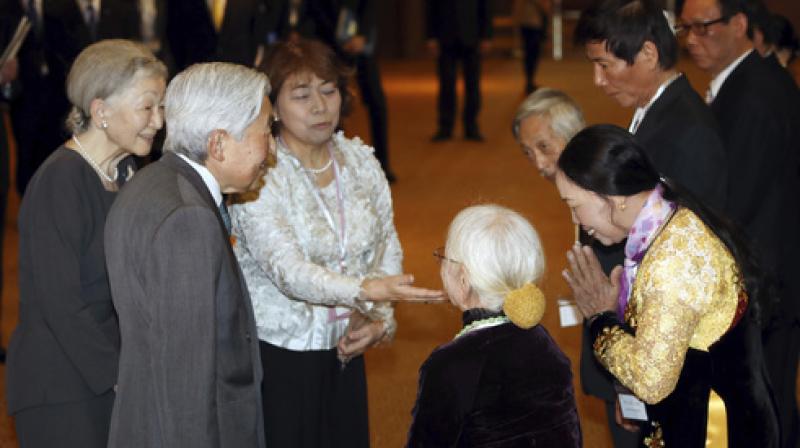Japanese Emperor expresses sympathy to Vietnamese left by soldiers
He told the families that he understands their difficulties and hopes that bilateral relations will continue to develop.

Hanoi: Japan's emperor expressed sympathy to the Vietnamese families abandoned by Japanese soldiers after World War II during his landmark visit to the Communist country.
Akihito and Empress Michiko, in the first ever visit by a Japanese emperor, met with a wife and 15 children of former Japanese soldiers in Hanoi on Thursday. He told them that he understands their difficulties and hopes that bilateral relations will continue to develop.
"I understand that the Japanese soldiers who remained here experienced tough times and their families here also had numerous difficulties," he said through a translator. "I feel that peace is very precious."
Some 600 to 800 Japanese soldiers remained in Vietnam after Japan's surrender in 1945 and they helped train Ho Chi Minh's Viet Minh with their military expertise to fight the French colonial forces.
The first group of 71 soldiers was forced to leave after the Communists defeated French forces in 1954, abandoning their wives and children, who faced difficulties and discrimination.
The last group of soldiers left the North in 1960, but were able to bring their families.
Nguyen Thi Xuan, 92, was the only one among the few surviving wives who was healthy enough to meet with the imperial couple.
Xuan told the emperor while weeping that she was "very moved" to meet with them and was grateful for them spending their time taking care of the families of Japanese who were left behind.
Xuan told the emperor that her Japanese husband spent nine years fighting the French with Viet Minh and when he left in 1954, she had to raise her four children, including one born after he left.
"It was so hard for you," the emperor comforted her. Xuan and her husband only met for a reunion 52 years later. Cao Khanh Tuong was one of the 15 children of ex-Japanese soldiers to meet with the imperial couple.
"I really hope that the historic visit by the emperor and empress will help to connect us with our countrymen in Japan for better understanding," he said.
Tuong said families with Japanese blood used to be faced with discrimination. "Our neighbours would not allow their children to play with us, calling us sons of Japanese fascists, I was very sad," he said.
Tuong's father was forced to return to Japan in 1954, leaving behind his wife and four children. He was five years old then. "He told us that he would come back to take us to Japan in two years when the country was reunited, but it never happened," Tuong said.
Under the Geneva agreement, the country was divided into Communist North and pro-French South and general elections were to be held to reunite the country in two years.
The elections never took place and war with the United States soon followed.
"He's very nice and intelligent, he speaks fluent Vietnamese," Tuong said about his father, adding that the family received a letter and some toys from him in 1956 and another letter in 1958, after which they had no information about him.
The family only heard through the Vietnamese Foreign Ministry that he was alive until after the Vietnam War ended in 1975 and he could not come visit before he died in 1993, Tuong said.
Akihito said he was glad to see the relatives of former Japanese soldiers. "I'm glad to know that you still have special feeling... toward Japan," he said "I hope the bilateral relations will continue to develop."
Akihito will tour the ancient capital of Hue and leave for Thailand on Sunday to pay respect to the late Thai King Bhumibol Adulyadej and meet with new King Vajiralongkorn Bodindradebayavarangkun before returning home.

